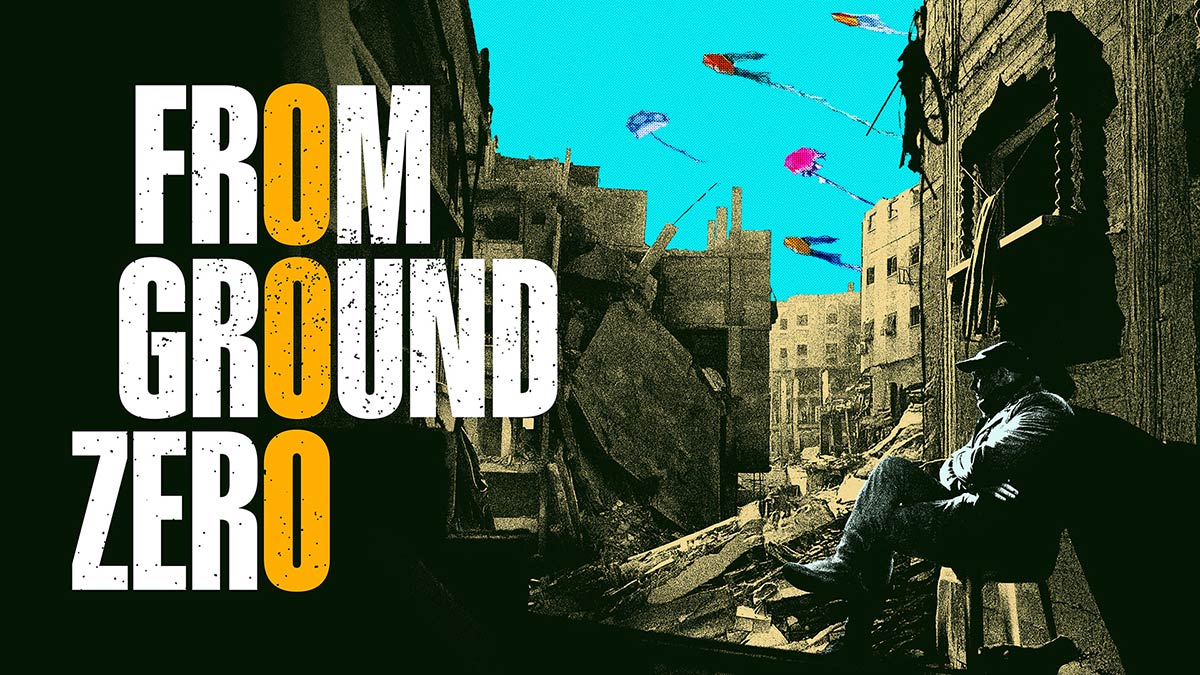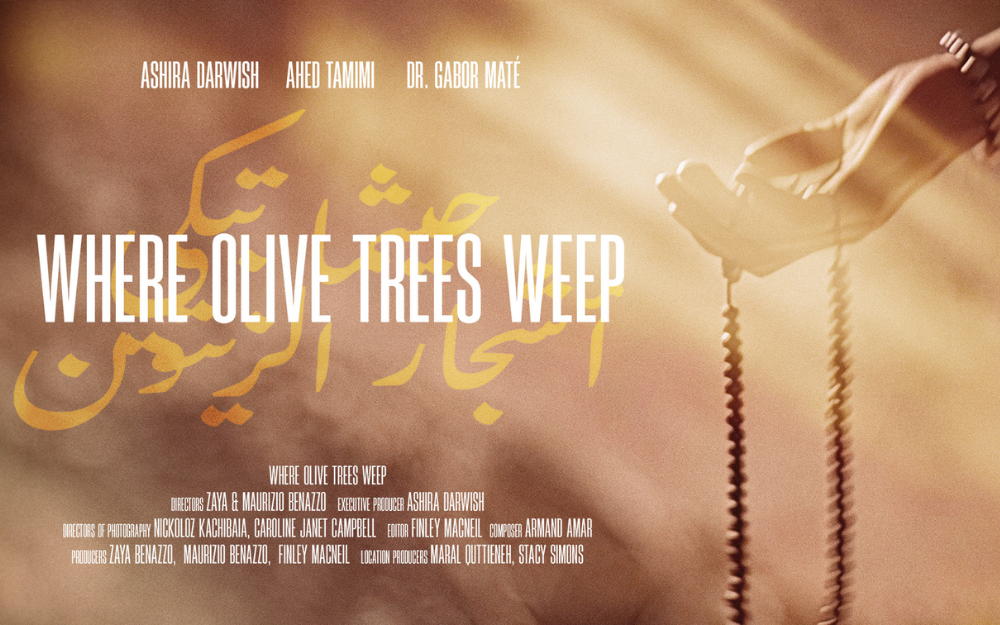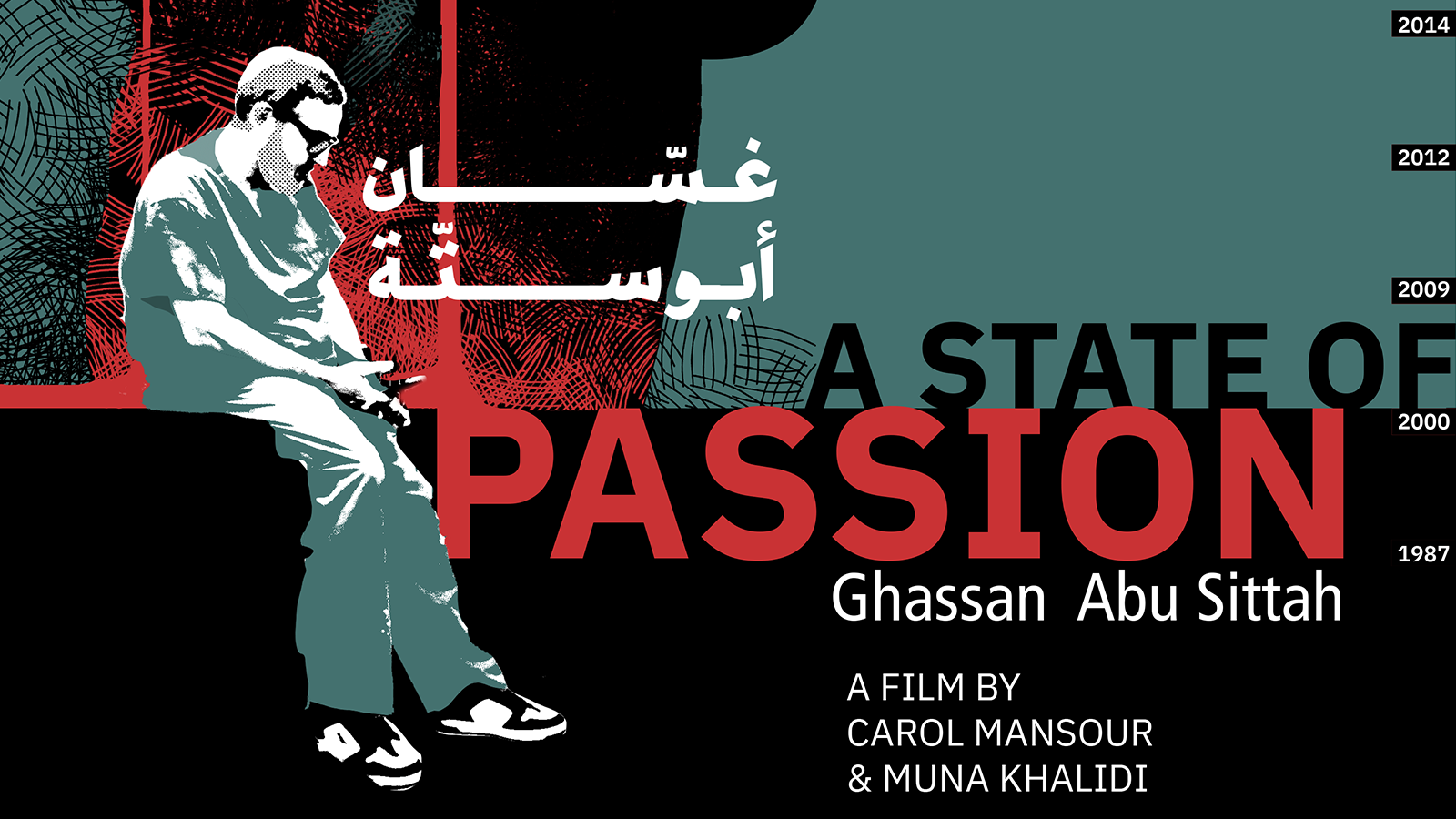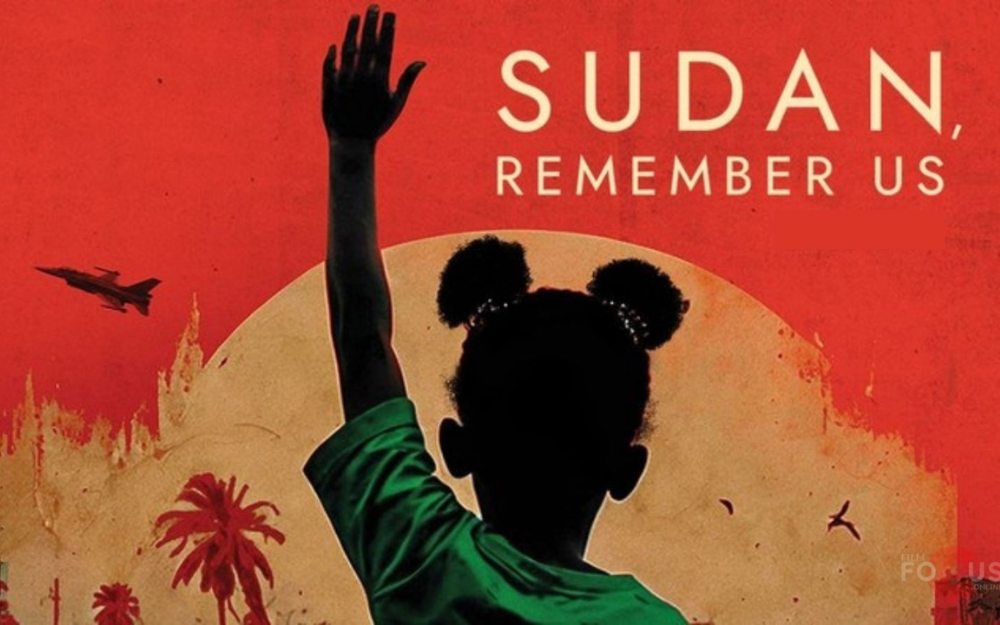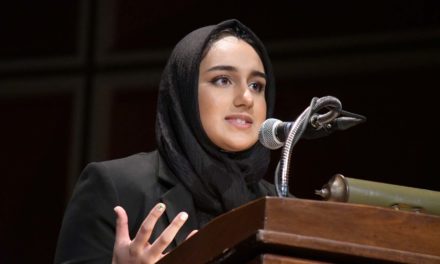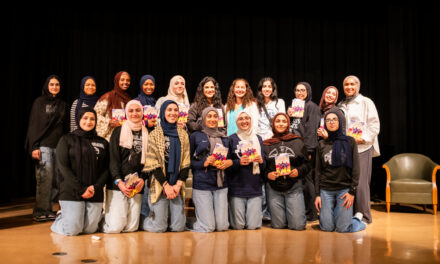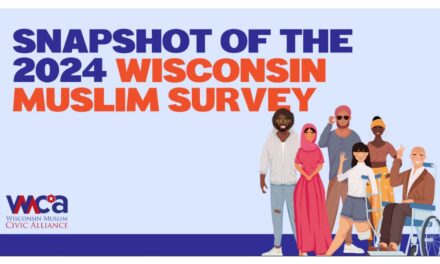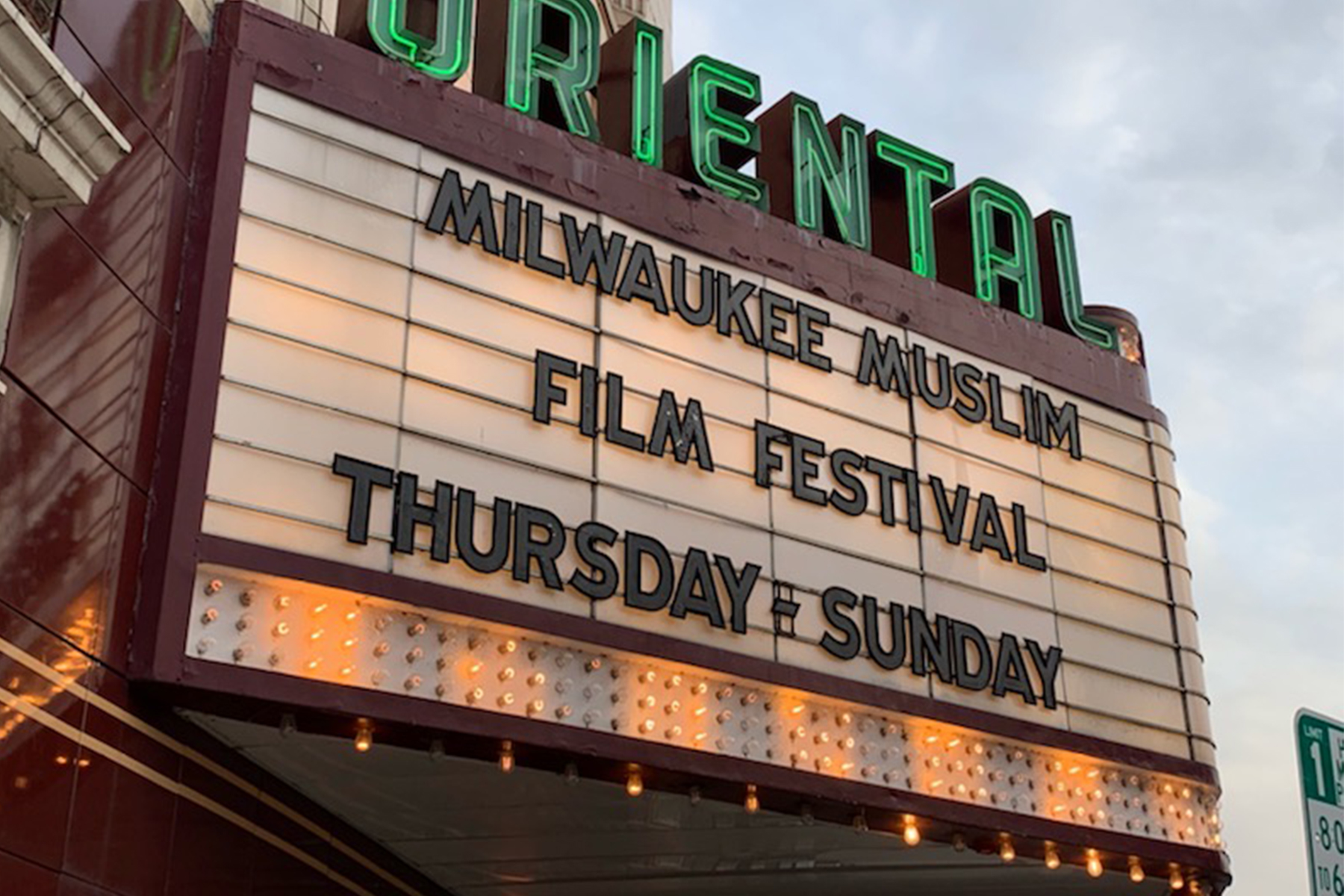
The historic Oriental Theatre’s marquee displays the 10th annual Milwaukee Muslim Film Festival, running Thursday, Oct. 2 – Sunday, Oct. 5.
At the Milwaukee Muslim Film Festival, when a movie ends, the talkback begins.
As the credits roll, an individual or panel makes their way to the stage to lead a discussion with the audience. Sometimes it’s the film’s creators; other times it’s people with expertise or personal experience with the topic addressed. Audience members become participants, asking questions and contributing different views.
The 10th annual Milwaukee Muslim Film Festival, Oct. 2 – 5, at the Oriental Theatre in Milwaukee features an exceptional opportunity for audiences to engage with a Middle East expert/Palestinian American journalist, an eye witness, a respected psychologist, an engaged activist and more in talks about the most pressing issues of our times, including Gaza and Sudan.
“Talkbacks are an impactful part of the Milwaukee Muslim Film Festival, especially when people share personal experiences, cultural insights or professional expertise,” MMFF founder Janan Najeeb told Wisconsin Muslim Journal. “Rather than just passively watching a film, it allows the audience to process what they just saw, ask questions and get other people’s take on it.”
WMJ interviewed a few of this year’s guest speakers: a world-renowned Palestinian American journalist and scholar of the Middle East, a respected psychologist and director of a large healthcare system’s behavioral health therapy, a doctor who recently volunteered in Gaza and speaks as an eye witness, and an organizer and advocate who calls on the world to remember Sudan.
“From Ground Zero,” 10/2 at 7 p.m. Purchase tickets (Click on image to view trailer.)
Rami Khouri: World renowned expert on journalism and the Middle East
Opening night talkback speaker after From Ground Zero, Thursday, Oct. 2, 7 p.m.
Palestinian American journalist and scholar Rami Khouri of Cambridge, Massachusetts is a well-known Middle East expert and journalist, regularly doing three to four interviews a week on news programs across the world about Gaza, Lebanon, Iran, U.S. foreign policy and other topics. He wrote a syndicated column and analytical op-eds that ran in leading newspapers for decades; now he makes them available for free on his Substack.
As the second anniversary of the War on Gaza approaches, his already busy pace picked up. In the past two weeks, Khouri has been interviewed on Al Jazeera, TRT Turkish global television and radio, Serbian Insider TV, Asia One in Pakistan and San Francisco’s NPR station (to air on Oct. 7). He offered a briefing to Mass Peace Action, spoke on an Arab Center Washington D.C. podcast and an Australia’s Palestine Justice Movement podcast. He participated in panels for the Just World Education Foundation, a book discussion on My Brother, My Land in Boston and a Soufan Center 9/11 Memorial Seminar on terrorism and security threats in New York City. And meanwhile, he wrote an op-ed for Al Jazeera on the recent recognition of the Palestinian State by western governments and several commentaries on his Substack.
And yesterday, he was on Turkish public television again.
“I probably missed a few,” Khouri said in an interview with WMJ last week.
As a journalist, he served as managing editor of The Jordan Times (Amman) and The Daily Star (Beirut), and a contributing reporter and opinion writer to the Financial Times, the Washington Post, the Boston Globe, NPR, BBC radio and other major outlets. He continues to work as a journalist and book author.
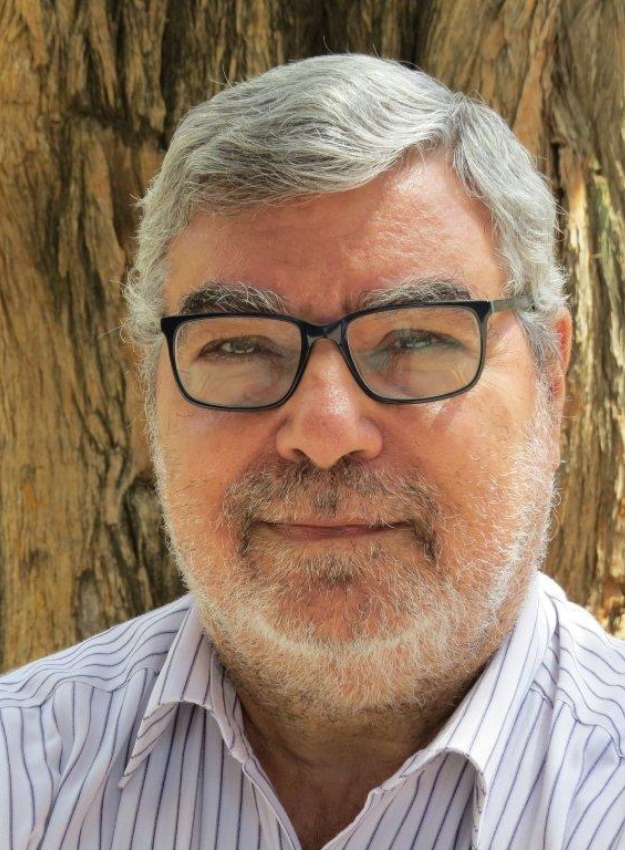
Palestinian American journalist and academicRami Khouri is the opening night talkback speaker for From Ground Zero, Thursday Oct. 2, following the 7 p.m. showing of From Ground Zero.
As an academic, he is a senior fellow at the Arab Center Washington, D.C., and a distinguished fellow at the American University of Beirut, where he founded and managed the Issam Fares Institute for Public Policy and International Affairs at the American University of Beirut.
He has been a Harvard Nieman Journalism Fellow, a Harvard Kennedy School senior fellow and a fellow of the Palestinian Academic Society for the Study of International Affairs in Arab East Jerusalem, as well as a visiting scholar at Villanova, Oklahoma, Mt. Holyoke, Syracuse and Tufts Universities.
“I’ve dedicated my life to teaching journalism, training journalists and practicing journalism. I’ve worked locally in the Middle East in newspapers, magazines, radio, TV and practically every kind of media you can think of, but also contributed to news media internationally.
“My whole life has been dedicated to promoting a two-way flow of accurate information between the Arab people and people around the world,” he said. “After the Oslo Agreement, when it was easier to travel, I would go from Jordan to the West Bank and to Gaza. I led journalism training in Gaza twice, for two or three weeks each time.
“It was a moving experience,” Khouri recalled. “Gaza has always been a poor place in terms of its economic wealth. To see these young Palestinian journalists so eager to learn to become serious journalists and to write about their lives, their stories, their humanity, I was so lucky to experience that with them.
Similarly, the perseverance of Palestinian journalists in Gaza today is moving, Khouri said. “The persistence, bravery, courage and professional commitment of young Palestinian journalists in Gaza over the last almost two years have made it possible for the basic realities of their lives – the gruesome, grotesque and brutal – to be presented. Many are not trained. They are learning on the job, while Israeli drones fly overhead.
“Over 240 of them have been killed, targeted killings, not random accidents,” he added. “Journalists are targeted as well as the health workers. Those are the two key professional groups that the Israelis want to destroy because they don’t want the Palestinians to be able to tell their story and they want the Palestinians not to be able to live.
“What we’re seeing in Gaza today, with the Israeli bans on international journalists, are only a more acute form of what we’ve seen them do throughout the last century in Palestine. It is what we see in much of the Middle East where governments try to control the flow of information. Now it is happening in the United States and in parts of Europe.
“One reason so many people in the U.S. and Europe are out in the streets protesting is not only because they see the Palestinians mistreated; they see the Israeli manipulation of the media and its negative impact on the U.S. They see the political dynamics impacting their own fundamental rights, freedoms and constitutional liberties as American citizens.
“They see right-wing, conservative groups explicitly wanting to prevent Palestinian voices from being heard and from people calling out for justice in Palestine. We know from history when you start preventing one group from speaking out, next week it’s another. First, they stopped the Jews from speaking, then went after the Catholics, then the Blacks. It’s important to see the Israeli practices in Gaza as part of a global process, not just as a local, isolated one.
“What they are doing is backfiring. It’s increasing the global coverage of Palestine. That’s why we are witnessing today this extraordinary global surge of support for Palestinian rights, the rights to live in a state, to not be occupied and subjugated.”
“Where the Olive Trees Weep,” 10/4 at 4 p.m. Purchase tickets (Click on image to view trailer.)
Munther Barakat, Psy.D., Aurora Health Care System’s director of Behavioral Health Therapy
Talkback speaker after Where the Olive Trees Weep, Saturday, Oct. 4, 4 p.m.
Dr. Munther Barakat, who has almost 20 years of experience as a psychologist and has helped develop suicide prevention protocols within a psychiatric hospital setting, will lead a discussion on the psychological impact on Palestinians suffering under occupation.
“We see the physical trauma and the physical disabilities Palestinians experience under the occupation and in the current onslaught in Gaza,” Dr. Barakat said in an interview with WMJ. “Of course, depression and trauma are extremely high among the Palestinians. But we rarely talk about the generational trauma that they experience.
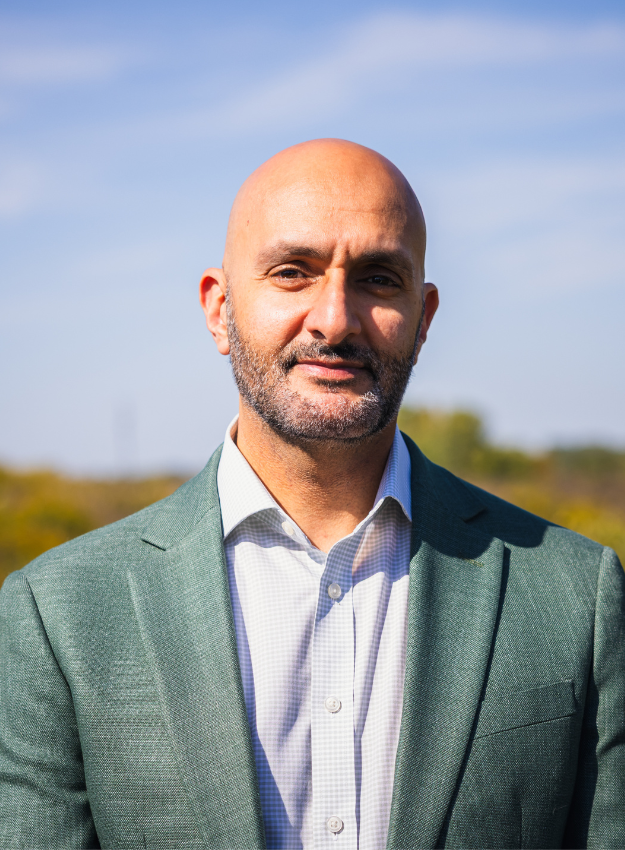
Munther Barakat, Psy.D., is the talkback speaker for “Where the Olive Trees Weep,” Saturday, Oct. 4 at 4 p.m.
“When you see what is happening—starvation in Gaza and an apartheid situation in the West Bank, with lack of freedom of movement, aggression from the settlers, the confiscation of land — in the face of this oppression, we can consider how it impacts them psychologically.
“At the same time, the Palestinians offer so much to the world, showing how to be resilient in the face of all they are experiencing. Anyone who has been there will tell you about it. They want to rebuild. They want to hope they will have the ability to live a normal life.”
One challenge with the trauma Palestinians face is that it is generational, Barakat said. “When trauma results from a singular significant traumatic experience in the life of an individual, we can focus on that trauma process and therapies around it. With generational trauma, a lot more work needs to be done. Significant loss has been experienced through multiple generations. We can work through the trauma associated with one loss but the next day they have another—the loss of a father, a sister, a cousin, and here we go again.”
In addition, when dealing with trauma itself, “a change is necessary in the environment as well.” That’s obviously impossible in the Palestinians’ situation. “A lot of work needs to be done.”
“State of Passion,” 10/4 at 7 p.m. Purchase tickets. (Click on image to view trailer)
Aziz Rahman, M.D., Interventional Radiologist, medical volunteer in Gaza
Talkback speaker after State of Passion, Saturday, Oct. 4, 7 p.m.
Dr. Aziz Rahman of Franklin is an interventional radiologist working in Greater Milwaukee and Sheboygan. He will speak after a film that features the work of British surgeon Ghassan Abu Sittah, M.D., who served as a volunteer in Gaza and who was among the first to expose the suffering of Palestinians in Gaza to the world.
Dr. Rahman went to Gaza in late June to work in Nasser Medical Complex, the last functioning hospital in Gaza. Like Dr. Abu Sittah, he too feels an obligation to be an eyewitness about the realities in Gaza, he told WMJ.
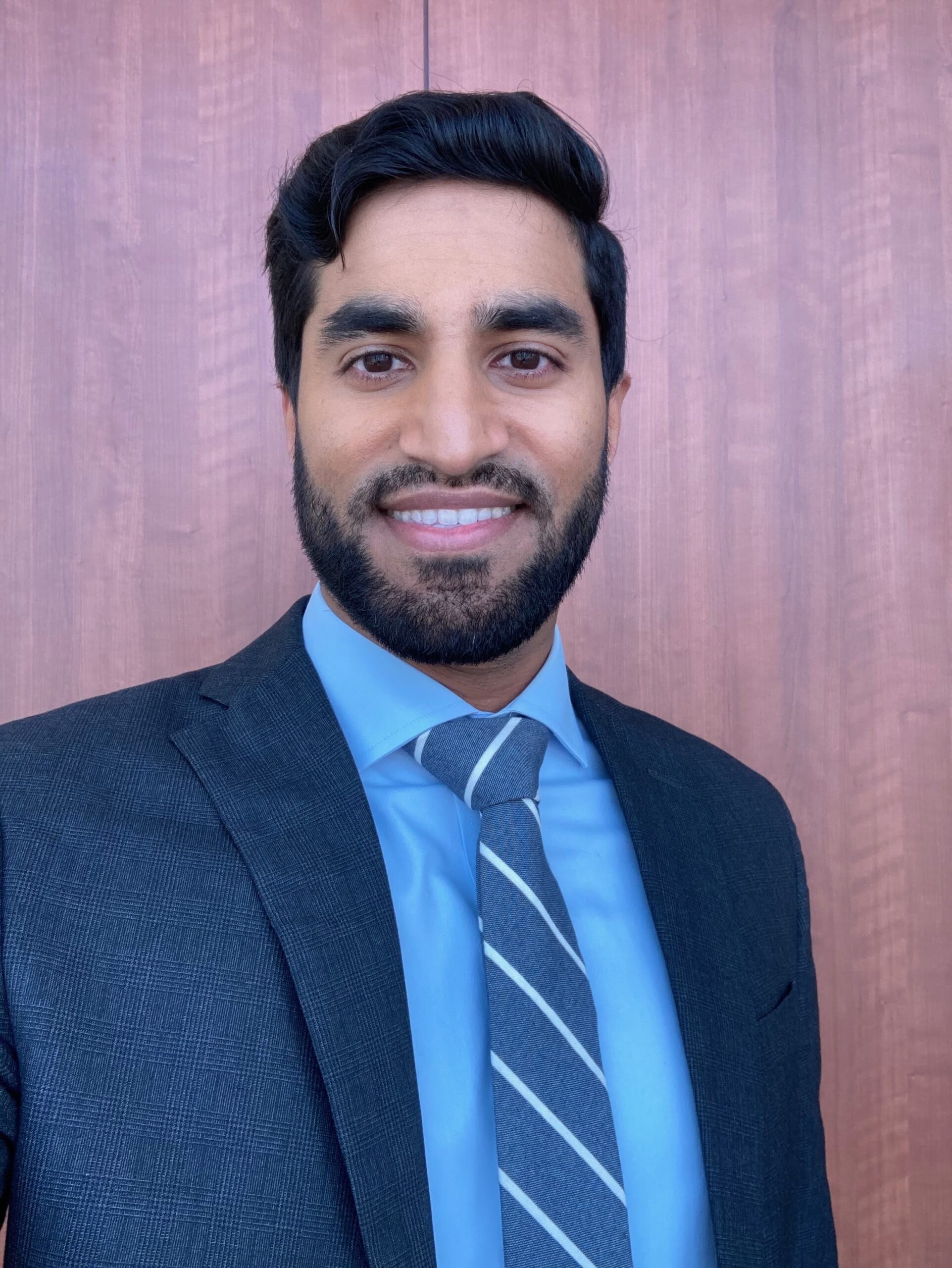
Aziz Rahman, M.D., is the talk back speaker for State of Passion on Oct. 4 at 7 p.m.
“I feel an obligation to speak out because no journalists are allowed in. Physicians who go there and come back are the only ones who can bear witness, except for the locals who unfortunately the world does not want to believe. If we don’t speak up, no one will.
“My intention is to bring light to the militarized aid of the Gaza Humanitarian Foundation, a farce of aid distribution. When we were there, we saw all these casualties of people who were being shot at or exploded when they were trying to get aid.
“On top of that, I want to describe the lack of medical infrastructure, the lack of equipment, supplies and how, even to the point that baby formula was being banned and confiscated at the border, we weren’t able to bring aid in.
“I want to note that the local medical specialists, Gazans who are highly educated individuals, trained to become orthopedic surgeons and other specialists, are being targeted as part of the destruction of the healthcare system infrastructure and the academic brains behind it.
“I also wanted to point out the resilience in the people. When we got there, students were taking their medical board exams. It was really fascinating, that these medical students were coming to work every day in middle the genocide, excited to learn.”
“Sudan, Remember Us,” 10/5 at 1 p.m. Purchase tickets. (Click on image to view trailer.)
Yasmine Mohamed Ahmed, founder of Uniting Milwaukee Muslims for Action
Talkback speaker after Sudan, Remember Us, Sunday, Oct. 5, 1 p.m.
Yasmine Mohamed Ahmed of Milwaukee is a community organizer, advocate and founder of UMMA MKE, Uniting Milwaukee Muslims for Action, an initiative dedicated to advancing justice for marginalized communities locally and globally. She is also a Sudanese American.
Ahmed brings a unique perspective to the discussion. “I cross many intersections,” she told WMJ. “I’m Black, I’m Muslim, I’m a woman.” The organization she founded addresses the concerns of marginalized communities and “that means everybody, not just Muslims,” she said.
“As a Black Muslim woman, I bring an intersectional lens that connects Sudan’s story to a broader African and Muslim experience of resilience and survival. The struggle against erasure.
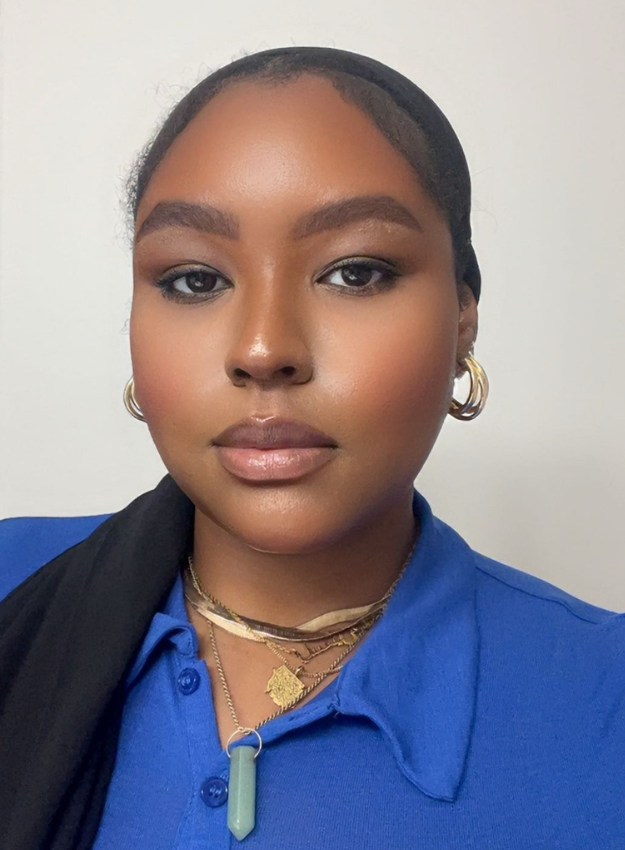
Yasmine Mohamed Ahmed is the talkback speaker for “Sudan, Remember Us,” on Oct. 5 at 1 p.m.
“My identity allows me to speak both to the visibility and invisibility of being a Black Muslim and how often we are overlooked globally.
“My experience of advocating for immigrants and for racial justice allows me to draw parallels between Sudan’s struggle and the struggles here in Milwaukee, showing how local and global justice are interconnected.
“I want people to walk away from this film and talkback seeing Sudan and Africa in general not just through the lens of crisis but through the human beings we are. We’re resilient. We’re strong. We have dignity.
“Our suffering is constantly shown without context or compassion. It’s just more Black people going through something. This film gives us an opportunity to remember Sudan in its fullness and to connect Sudan’s stories with everyone else’s.
“Solidarity can start with awareness.”
